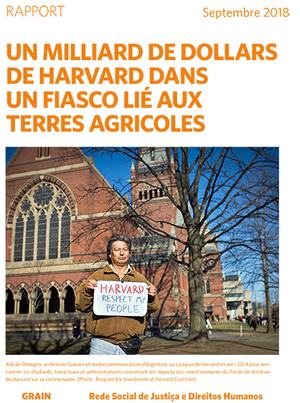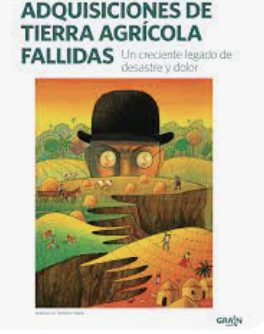GRAIN is a small international non-profit organisation that works to support small farmers and social movements in their struggles for community-controlled and biodiversity-based food systems. Our support takes the form of independent research and analysis, networking at local, regional and international levels, and fostering new forms of cooperation and alliance-building. Most of our work is oriented towards, and carried out in, Africa, Asia and Latin America.
GRAIN’s work goes back to the early 1980s, when a number of activists around the world started drawing attention to the dramatic loss of genetic diversity on our farms — the very cornerstone of the world’s food supply.
We began doing research, advocacy and lobbying work under the auspices of a coalition of mostly European development organisations. That work soon expanded into a larger programme and network that needed its own footing. In 1990, Genetic Resources Action International, or GRAIN for short, was legally established as an independent non-profit foundation with its headquarters in Barcelona, Spain.
By the mid-1990s, GRAIN reached an important turning point. We realised that we needed to connect more with the real alternatives that were being developed on the ground, in the South. Around the world, and at local level, many groups had begun rescuing local seeds and traditional knowledge and building and defending sustainable biodiversity-based food systems under the control of local communities, while turning their backs on the laboratory developed ‘solutions’ that had only got farmers into deeper trouble. In a radical organisational shift, GRAIN embarked on a decentralisation process that brought us into closer contact with realities on the ground in the South, and into direct collaboration with partners working at that level. At the same time, we brought a number of those partners into our governing body and started regionalising our staff pool.
By the turn of the century, GRAIN had transformed itself from a mostly Europe-based information and lobbying group into a dynamic and truly international collective — functioning as a coherent organisation — that was linking and connecting with local realities in the South as well as developments at the global level. In that process, GRAIN’s agenda shifted away from lobbying and advocacy much more towards directly supporting and collaborating with social movements, while retaining our key strength in independent research and analysis.
GRAIN is an organisation that represents no one but itself. However, it is through collaboration and partnerships that we link in with local and national realities and play a meaningful role in our information, research, advocacy and networking activities, be it in the regions or at international level. In fact, we work with many groups in different parts of the world to produce and disseminate collaborative publications and analyses, and engage in other collaborative projects.
Between April and June 2012, GRAIN underwent its latest external evaluation. This evaluation focused on GRAIN’s work on land grabbing, over the period 2008-2011. The executive summary and recommendations are available here. (A copy of the full report can be made available on request.)
Members:
Resources
Displaying 11 - 15 of 49Harvard's billion-dollar farmland fiasco
One of the world's major buyers of farmland is under fire for their involvement in land conflicts, environmental destruction and risky investments. A new report by GRAIN and Rede Social de Justiça e Direitos Humano presents, for the first time, a comprehensive analysis of Harvard University's controversial investments in global farmland.
The report finds that:
Harvard dépense un milliard de dollars pour l’acquisition de terres agricoles et les communautés rurales du Brésil en paient le prix, indique un nouveau rapport
Failed farmland deals: a growing legacy of disaster and pain
GRAIN has documented at least 135 farmland deals for food crop production that have backfired between 2007 and 2017. They represent 17.5 million hectares. These are not failed land grabs, since the land almost never goes back to the communities, but failed agribusiness projects. While higher standards of due diligence and stronger forms of liability are surely needed, the real challenge is to get the land back to the communities. No one should rest until that is achieved.
Adquisiciones de tierra agrícola fallidas: un creciente legado de desastre y dolor
El año 2017 terminó como uno de los más fatídicos para los defensores de la tierra. También fue un año muy malo para muchos acaparadores de tierras. Un número significativo de adquisiciones, de grandes extensiones de tierras agrícolas, colapsó, agregándose a una lista creciente de proyectos que han fracasado en años recientes. Si bien esto es una buena noticia para las comunidades afectadas, a muchas de ellas se les deja enfrentadas a esta caída y teniendo que seguir luchando por recuperar sus tierras.
Land conflict in Côte d’Ivoire: local communities defend their rights against SIAT and the state
Conflict began in August 2011 when 3 village communities in eastern-central Côte d’Ivoire learned that the Belgian corporation SIAT was about to move onto their land. Report details the increasing conflicts and legal battles that followed.





